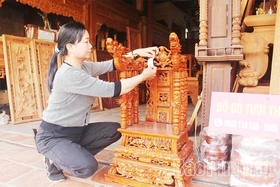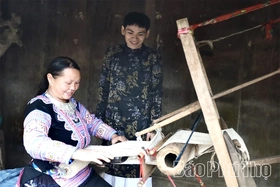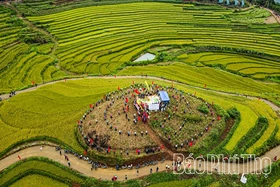{title}
{publish}
{head}
After the administrative merger, Phu Tho now boasts an extensive cultural treasure with 2,778 historical relics and nearly 2,000 intangible heritages, among which Hat Xoan singing and the Hung Kings Worship Belief have been recognized by UNESCO. Every year, tens of millions of visitors return to the Ancestral Land to pay tribute to their origins and immerse themselves in the festive atmosphere, generating tens of trillions of VND in revenue from tourism and related services.

Xoan singing is a highlight performance in the opening ceremony of the Hung Kings’ Death Anniversary and the annual Hung Temple Festival.
Between 2021 and 2025 alone, nearly 250 relics have been restored with a total investment of over 1.1 trillion VND. These figures demonstrate the strong determination of Party committees, authorities, and local communities to revive cultural and historical sites—not only to preserve memory and enrich cultural values but also to create new spaces for tourism, festivals, and services. When traditional festivals evolve into tourism products, heritage confidently steps beyond village boundaries, joining the rhythm of modern development to generate unique cultural values that promote the homeland and bring tangible benefits to the community.
Building on that foundation, Phu Tho is taking bold and strategic steps to shape a true cultural industry—not merely preserving and promoting culture, but also “creating wealth from culture.”
According to the Director of the Department of Culture, Sports and Tourism (DoCST), during the 2020–2025 term alone, the Department has advised the promulgation of six resolutions, two action programs, twelve resolutions of the Provincial People’s Council, and hundreds of decisions and plans by the Provincial People’s Committee. These efforts have established a favorable legal corridor for the development of culture, sports, and tourism.
Tourism—closely linked to the cultural industry—has truly become a bright spot. Phu Tho currently has two national tourist areas (Hung Temple and Tam Dao), 15 provincial-level tourist sites, and more than 1,500 lodging facilities with a total of 20,000 rooms. By 2025, the province expects to welcome 14.5 million visitors, earning an estimated 14.8 trillion VND in revenue with an average annual growth rate of over 10%. These numbers illustrate how the heritage of the Ancestral Land is generating significant resources for the local budget while affirming that cultural tourism can indeed become a key economic sector. The province has set a clear direction: by 2030, tourism must truly become a spearhead industry, and the cultural industry must contribute directly to the provincial GRDP. This is not only a growth target but also an expression of Phu Tho’s aspiration to establish itself as “the cultural heart” of the nation—a place where Vietnam’s soft power emanates from the sacred roots of the Hung Kings.
To realize these aspirations, Phu Tho has implemented a series of systematic and scientific initiatives: accelerating the digitalization of cultural heritage; preparing UNESCO nomination dossiers for Mo Muong chanting and the Worship of Mother Goddesses at Tay Thien; investing in the restoration of the Special National Relic Hung Temple and revolutionary heritage sites; while encouraging greater social participation in cultural development and promotion. These efforts aim to create creative spaces, modern museums, and cultural complexes—connecting heritage with technology, blending culture with tourism and sports—to form a comprehensive cultural industry ecosystem.
Nguyen Yen

baophutho.vn On December 8, 2017, at its 12th session, the UNESCO Intergovernmental Committee for the Safeguarding of Intangible Cultural Heritage...

baophutho.vn Situated in the fertile land of Binh Nguyen (Vinh Phuc), the Huong Canh Communal House Complex — comprising Huong Canh, Ngoc Canh and Tien...

baophutho.vn For generations, whenever people mention Huong Canh Town (former Binh Xuyen District, Vinh Phuc Province), now Binh Nguyen Commune of Phu Tho...

baophutho.vn Kha Cuu Commune was formed by merging three former communes: Dong Cuu, Thuong Cuu, and Kha Cuu, with the Muong ethnic group accounting for over...

baophutho.vn Perched atop Tram Linh Hill, Quoc Te Temple in the former Di Nau Commune — now Tho Van Commune — has long been regarded as a solemn and...

baophutho.vn Located in Giap Lai Commune, this ancient communal house is revered by local residents as the “soul of the Muong village.” It is dedicated to...

baophutho.vn The Thai people are the largest indigenous ethnic group in Mai Chau District, now residing mainly in communes such as Mai Chau, Bao La, Mai Ha,...

baophutho.vn Today, Phu Tho Province is home to hundreds of traditional craft villages — from wood carving, blacksmithing, and bamboo weaving to mechanics,...

baophutho.vn In line with the orientation toward tourism-based economic development, the traditional brocade weaving craft of the Mong ethnic group in Pa Co...

baophutho.vn On the morning of October 25, the opening ceremony of the Mien Doi Terraced Fields Festival 2025 took place in Thuong Coc Commune.